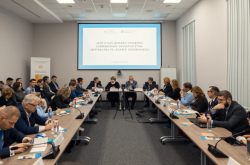Digital Transformation & Global Society is an international scientific conference in the field of interdisciplinary online studies. Its mission is to provide a platform for discussions centered around the influence of new digital technology on the social, economic and political processes. DTGS is organized by ITMO University and the Higher School of Economics (St. Petersburg).
The event includes a series of thematic roundtables, sessions, forums and seminars. One of the key events at DTGS-2018 was a plenary session attended by Stephen Coleman, a professor of political communication at the University of Leeds (UK), a leading theoretical expert in the field of e-democracy, political communication and new media.
Russian experts in e-governance and political governance also participated in the session. Among them were Leonid Smorgunov, head of the Department of Political Governance at the St. Petersburg State University, Olessia Koltsova, head of the Internet Studies Lab at the Higher School of Economics in St. Petersburg, Lyudmila Vidyasova, head of ITMO University’s Monitoring Research Department, and Yury Kabanov, a lecturer at the Higher School of Economics in St. Petersburg. Together, the scientists discussed the key trends in the development of e-democracy in Russia and Europe.

European Experience: Brexit, direct democracy and referendums
Bringing up Europe as an example, Stephen Coleman explains that in the recent years, the popularity of the methods of direct democracy has increased: in the past decade, 36 out of the 47 member-states of the Council of Europe have conducted local and national referendums.
How does one legitimize the results of a referendum? To answer that question, Prof. Coleman brought up the two referendums conducted over the past two years in the UK and Ireland. The first, the so-called Brexit, was held in 2016, with citizens casting their vote on whether the UK would stay a member of the European Union or leave it. According to the results, 51.9% voted for the UK to leave the EU. However, the turnout was 72.15%, meaning that approximately 13 million citizens did not get to express their opinion.
Another factor that affects the legitimacy of results is unequal representation. Most of the “leave” votes were made by the less-educated section of the UK population, while the turnout among the more educated citizens, e.g. Londoners, was lower.

A different set of circumstances is present in the referendum recently held in Ireland, which concerned the legal status of abortion. The referendum was initiated by the Citizens’ Assembly, which was created by the Irish Parliament as a response to demands for constitutional and political change. The Assembly, which includes 99 members picked randomly to represent all ages, genders, social classes and regions, was asked to consider the legal status of abortion in Ireland, among other things. The Assembly was also responsible for deciding on the format of the referendum, finally settling on both an online and offline vote.
Members of the Assembly also decided that the referendum would be conducted in three stages. During the first stage, citizens had time to learn about the various arguments and reasons for voting “yes” and “no”. This was followed by a series of public hearings and discussions in local and national media. The final stage, the negotiation stage, took place over the final two months before the referendum.
“I think there’s a huge difference between these two referendums, and it hinges on two main principles. The first is responsibility. When you’re dealing with any kind of democracy, be it direct or indirect, you must understand that the people casting their vote must be responsible for it. In the Irish case, citizens had a much greater degree of civil responsibility,” – explained Stephen Coleman – “And we must also account for the representation of social groups. During Brexit, the ratio of voters from various social groups was so uneven that it greatly affected the quality of the vote. In the Irish referendum, all groups were represented and were able to express their opinion. There were also more female votes than male ones, since this was first and foremost a question of their reproductive rights. At the same time, there was a clear balance of social groups, levels of education, etc.”
In conclusion, he noted that when talking about the matters of direct democracy, one shouldn’t forget about the issue of populism. It is why one of the tasks for researchers and specialists is to explain to the citizens the various mechanisms and ways of participating in political affairs.

Russian Experience: influx of online petitions and how to make them more useful
When discussing the Russian experience, Olessia Koltsova, head of the Internet Studies Lab at the Higher School of Economics in St. Petersburg, brought up the topic of online petitions. This form of expressing public opinions is much more popular today than it was 20 years ago, when there were few to none opportunities to create one. But even despite its popularity in Russia, this system still has its flaws.
Several years ago, the Russian Public Initiative website was launched. Citizens can log on using an official ID system and propose various initiatives and vote on those submitted by others. Petitions that have gathered 100,000 votes are then assessed by expert groups who can forward them to the State Duma.
“It might seem that this is a less-direct form of democracy, but nevertheless, we can see that out of the few successful petitions, most provide solutions to local or individual issues. Meanwhile, issues like corruption and other global matters are left out,” – notes Ms. Koltsova.
Another problem, says the expert, is the high assessment threshold for petitions. In Russia, it is a 100 thousand votes, while in the US, which has twice the population, the threshold is only 25 thousand votes.

According to Lyudmila Vidyasova, head of ITMO University’s Monitoring Research Department, one of the necessary conditions for making such platforms more effective is to get the authorities more involved in their operation. Such involvement should take the form of monitoring the initiatives and providing feedback to the demands of the public.
“Today, the website hosts 12 thousand petitions. In the first few months of its existence, during which we analyzed its stats, 300 to 400 petitions were filed per month. A year later, even though only few of them were accepted and assessed, the number of proposals grew approximately ten times,” – she says – “The numbers show that citizens, for a while, believed in the success of this system. But when initiatives are left unanswered, it’s difficult to talk about public consensus. That’s why I believe it’s important to motivate the government to respond and react to these petitions in some form. We can see from the US’s example that even the issues that aren’t particularly influential are still discussed by great number of people who are eager to share their ideas. I think it would be useful to employ similar mechanisms on these platforms that we say are democratic.”





